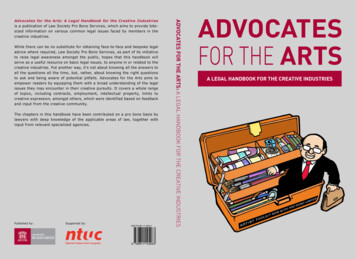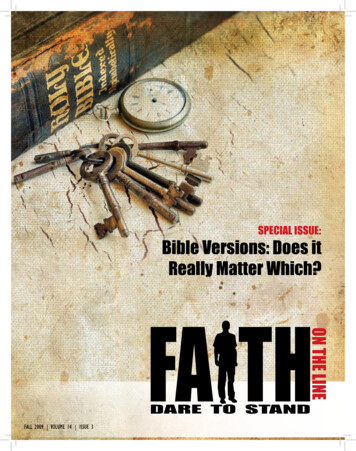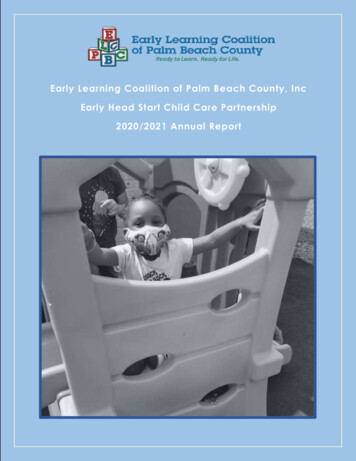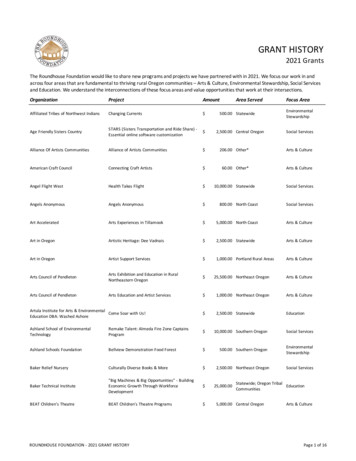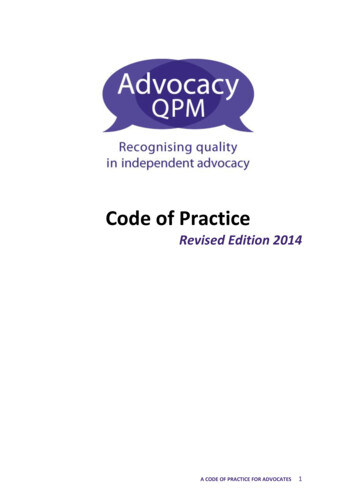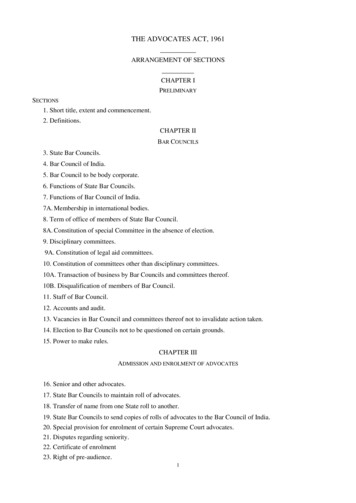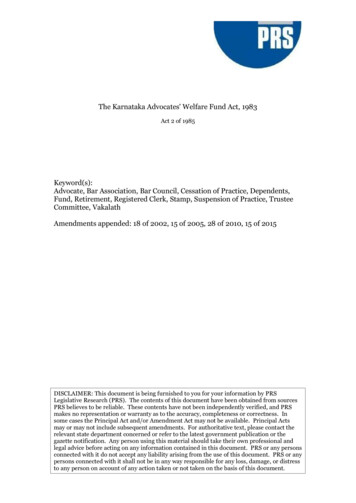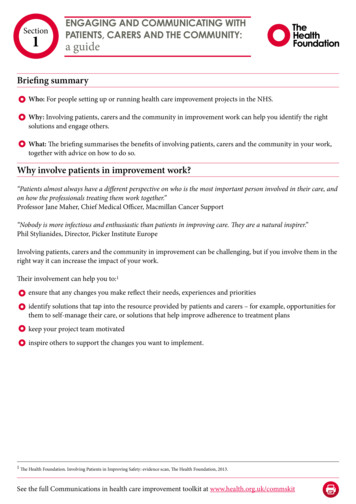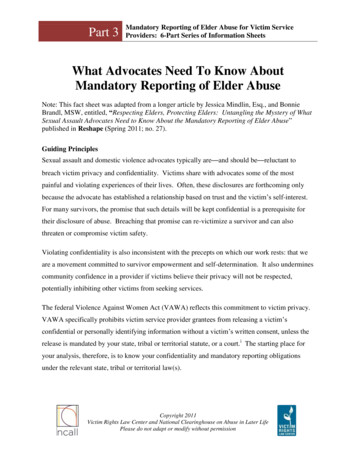
Transcription
Part 3Mandatory Reporting of Elder Abuse for Victim ServiceProviders: 6-Part Series of Information SheetsWhat Advocates Need To Know AboutMandatory Reporting of Elder AbuseNote: This fact sheet was adapted from a longer article by Jessica Mindlin, Esq., and BonnieBrandl, MSW, entitled, “Respecting Elders, Protecting Elders: Untangling the Mystery of WhatSexual Assault Advocates Need to Know About the Mandatory Reporting of Elder Abuse”published in Reshape (Spring 2011; no. 27).Guiding PrinciplesSexual assault and domestic violence advocates typically are—and should be—reluctant tobreach victim privacy and confidentiality. Victims share with advocates some of the mostpainful and violating experiences of their lives. Often, these disclosures are forthcoming onlybecause the advocate has established a relationship based on trust and the victim’s self-interest.For many survivors, the promise that such details will be kept confidential is a prerequisite fortheir disclosure of abuse. Breaching that promise can re-victimize a survivor and can alsothreaten or compromise victim safety.Violating confidentiality is also inconsistent with the precepts on which our work rests: that weare a movement committed to survivor empowerment and self-determination. It also underminescommunity confidence in a provider if victims believe their privacy will not be respected,potentially inhibiting other victims from seeking services.The federal Violence Against Women Act (VAWA) reflects this commitment to victim privacy.VAWA specifically prohibits victim service provider grantees from releasing a victim’sconfidential or personally identifying information without a victim’s written consent, unless therelease is mandated by your state, tribal or territorial statute, or a court.i The starting place foryour analysis, therefore, is to know your confidentiality and mandatory reporting obligationsunder the relevant state, tribal or territorial law(s).Copyright 2011Victim Rights Law Center and National Clearinghouse on Abuse in Later LifePlease do not adapt or modify without permission
A. Federal Confidentiality Obligations for VAWA-Funded Victim Service ProvidersMany sexual assault, domestic violence, and dual agencies receive direct or indirect fundingthrough the Violence Against Women Act (VAWA). In 2005, VAWA was amended to includeadditional privacy protections for victims (see 42 U.S.C. § 13925). This next sectionsummarizes VAWA’s confidentiality requirements for victim service providers.What Are VAWA’s Confidentiality Requirements?Under federal law, confidentiality is a grant condition for every state, tribe, or territory receivingVAWA funding. All victim service provider grantees and sub-grantees who receive fundingfrom the Violence Against Women Act (VAWA)ii must comply with VAWA’s confidentialityobligations. Grantees are required to protect the confidentiality and privacy of those receivingservices, and may not disclose personally identifying informationiii or confidential information,or reveal individual client information unless at least one of the following criteria is met:1) The victim executes a written, narrowly tailored, and reasonably time-limitedconsent form (also called a release of information), executed with the victim’sinformed consent;2) The victim service provider is required to release the information by statutorymandate (such as an elder abuse mandatory reporting law); or3) The information must be released pursuant to a court mandate.ivIn this context, the term “informed consent” means that, before signing the release, the victimunderstands what information will be released, why and to whom it is being released, what willhappen to the information once it is disclosed, the benefits and burdens of releasing the requestedinformation, and how to withdraw consent once it has been granted. Victims must also have themental capacity to give informed consent. Other federal funding laws, such as the Victims ofCrime Act (VOCA) and the Family Violence Prevention Services Act (FVPSA) also imposeconfidentiality requirements on grantees. Review your federal, state and funder obligations toensure you are compliant.Part 3: Page 2
B. State or Tribal Mandatory Reporting LawsVAWA’s confidentiality requirements permit VAWA-funded victim service providers to complywith their mandatory reporting obligations. To determine whether mandatory reporting lawsapply in any individual case, start by reading the applicable statute(s) and cases, paying specialattention to the relevant definitions. The primary considerations include: (1) who is a mandatoryreporter; (2) about whom must abuse be reported; (3) what constitutes elder abuse; (4) whatinformation must be reported; and (5) what exceptions, if any, apply to the duty to report. Eachof these questions is addressed below. (See Information Sheet # 6 for a flow chart of the issuesdiscussed below.)1. Are You A Mandatory Reporter Of Elder Abuse?vAlthough the answer to this question may seem obvious, sorting out whether you aremandated to report may be more complicated or nuanced than appears at first blush. Do you live in a state where everyone is a mandatory reporter? Does the statute list the specific professionals who are mandated reporters?o If yes, how is the professional group defined? For example, if all “school employees”are mandatory reporters, is a licensed substitute teacher who works as an advocatemandated to report? Do your mandatory reporting laws apply 24 hours a day/7 days a week, or only when youlearn about the abuse while working in your professional capacity? E.g., Must you reportabuse if you are a listed professional but learn about the abuse as a volunteer or neighbor? If you are licensed in more than one jurisdiction, be sure to address the impact of multistate licensing and cross-border services. Are you exempt from reporting in one state butobliged to report the abuse in another? Are you obligated to report as a matter of law or as a condition of employment?Sometimes, employers’ internal policies will require employees to report abuse. This isnot the same as a legal obligation to report and therefore does not fall within VAWA’s“court or statutory mandate” exception to the confidentiality requirements.Part 3: Page 3
2. Is the Victim An Older Adult and About Whom Abuse Must Be Reported?The age at which an individual is “older” or otherwise covered by a mandatory reporting lawdue to age is determined by each individual jurisdiction. The age threshold may range from 55 – 70, depending on state, territorial or tribal law. In some states, there is no specifically designated age at all. Such statutes mandatereporting when a “vulnerable,” “dependent,” or “at-risk” adult may be being abused. Anadult may be deemed vulnerable for any one of a number of reasons, including age,physical or cognitive disability, or other circumstance. Statutes (and case law) set out thecriteria to determine who is a “vulnerable,” “dependent,” or “at-risk” adult. Whether areporting obligation exists may also depend on who is committing the abuse (e.g., acaretaker or other person responsible for the victim’s care). Criteria vary fromjurisdiction to jurisdiction.3. What Is “Abuse”?Definitions of what constitutes “elder abuse” vary between jurisdictions. Be familiar withyour statutes and cases and confirm that what the victim experienced falls within the relevantlegal definition of “abuse,” “neglect,” or “exploitation.”4. What Must Be Reported?Determine what information must be reported. Does the statute require that the reporter provide only the victim’s name, address, andtelephone number? Must additional information be disclosed, such as the basis for the report, the name,location, and contact information for the alleged offender, or the names of the victim’sfamily members and care providers?Even if it’s awkward or controversial to withhold information from APS, without victimconsent advocates must limit their disclosure to the information required by the mandatoryreporting law. Advocates may not release information that exceeds the scope of what’sPart 3: Page 4
required or authorized. Even if APS asks for additional information to help them triage thecase, these details may not be released unless the older victim has signed a written, timelimited release of information for this specific purpose. Advocates must comply with the lawand only provide information that is mandated by statute or authorized by the older victim (orthe victim’s legal guardian, as applicable). Disclosing information that is not legally requiredto be reported, without victim consent, violates a victim’s right to privacy. It will likely alsocontravene the advocate’s federal and state confidentiality obligations.5. What Reporting Exemptions Apply?Information may be exempt from disclosure even though it appears to meet all the mandatoryreporting criteria. One of the most likely exemptions is if the victim’s information isprotected by a legal privilege such as attorney-client, clergy-penitent, or victim-(communitybased) advocate.If your communications with a victim are privileged, determine the scope of the privilege andwhat conditions must be met both for the privilege to apply and for it remain in effect. Does the privilege extend only to disclosures the victim makes in the context of theprivileged relationship, or may two professionals, each of whom has a privilegedrelationship with the victim, communicate and keep the privilege intact? For example,may the victim’s lawyer and medical provider discuss the case without compromising thedoctor-patient and attorney-client privileges? Does the privilege encompass the use of an interpreter or translator? Does a waiver of the privilege have to be intentional or can it be inadvertent?Remember that, because the privilege belongs to the victim, and not the provider, it is thevictim and not the provider who may waive it. For a flow chart to help you analyze yourreporting obligations, see Part 6: Elder Abuse Mandatory Reporting Flow Chart. For adiscussion of how mandatory reporting laws may benefit and/or harm older victims, see Part2: Mandatory Reporting of Elder Abuse: Exploring the Benefits and Harms.Part 3: Page 5
Disclaimer: The general information presented here is intended for educational purposes only. It does not constituteand is not a substitute for independent legal advice and should not be relied upon for that purpose. If you need legaladvice you should consult with your own attorney.VAWA defines the term “victim services provider.” See 42 U.S.C. § 13925(a)(36). If a release isrequired, the victim service provider must take steps to protect the safety of the victim and others affectedby the release. See 42 U.S.C. § 13925 (b)(2)(C).ii42 U.S.C. § 13925 (b)(2).iii“Personally identifying information” is “information that is likely to disclose the location of a victim ofdomestic violence, dating violence, sexual assault, or stalking, including a victim’s first and last name; ahome or other physical address; contact information (including a postal address, e-mail address, telephoneor fax number); social security number, and any other information, including date of birth, racial orethnic background, or religious affiliation, that, in combination with any of the above information, wouldserve to identify any individual.” 42 U.S.C. § 13925 (a) (18).ivIf a court mandates that the victim’s private information be released, the victim service provider shouldtake steps to ensure that a court order was properly issued.vYou will also want to know which, if any, of your colleagues are mandatory reporters. This informationmay impact what information will be shared within – and between – provider organizations.iThis project was supported by Grant No. 2004-WT-AX-K024 (VRLC) and Grant No. 2005-EWAX-K003 (NCALL), awarded by the Office on Violence Against Women, U.S. Department ofJustice. The opinions, findings, and conclusions expressed are those of the authors and do notrepresent the official position or policies of the U.S. Department of Justice.Part 3: Page 6
Mandatory Reporting of Elder Abuse Note: This fact sheet was adapted from a longer article by Jessica Mindlin, Esq., and Bonnie Brandl, MSW, entitled, "Respecting Elders, Protecting Elders: Untangling the Mystery of What Sexual Assault Advocates Need to Know About the Mandatory Reporting of Elder Abuse"


